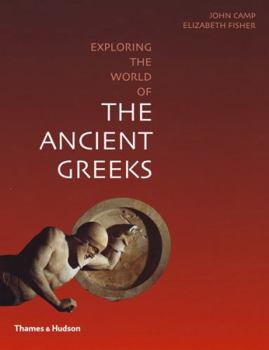Exploring the World of the Ancient Greeks
(Part of the Exploring the World Series)
Select Format
Select Condition 
Book Overview
The ancient Greeks set out from their homeland to colonize and settle almost all the Mediterranean and Black Sea coasts. They were a remarkable people, who have left their imprint on virtually every aspect of modern human endeavour - politics, theatre, art, philosophy, medicine, architecture and athletics. This exceptional book reveals how they developed and adapted from Paleolithic times on, and how they interacted, both peaceably and otherwise,...
Format:Paperback
Language:English
ISBN:0500288747
ISBN13:9780500288740
Release Date:April 2010
Publisher:Thames & Hudson
Length:224 Pages
Weight:1.70 lbs.
Dimensions:0.7" x 7.5" x 9.6"
Customer Reviews
3 ratings
A basic, watered-down, beautiful illustrated Introduction to Ancient Greece
Published by Thriftbooks.com User , 15 years ago
If you want a great coffee table book on the Ancient Greeks, this is it. The information is distributed in small, easy to digest chunks - there is nothing that will offend the senses. It is beautifully illustrated with amazing photographs, illustrations, and maps. More serious scholars or those who want to learn more about Greek culture than the bare minimum - this would be a pass (well, the pictures are *really* nice).
Welcome to Ancient Greece!
Published by Thriftbooks.com User , 17 years ago
This book constitutes a superb visual tour of ancient Greece, beginning with the earliest artifacts and continuing through the Roman period. With abundant pictures, maps and drawings it is a feast. The text should not be slighted; it is up-to-date and highly informative, yet an entertaining and enjoyable read, and interposes many quotes from ancient sources to add depth. The book serves at once as a reminder or the glories of Greece, a reference for much of Greek culture, and a doorway to further inquiry. It is not an in-depth scholarly analysis, but a wonderful excursion through Greek culture that will lead you to greater understanding and a thirst for more. Finally, the book itself is a pleasure to see and hold. It will serve for many years as a reference and a place to browse through history.
A concise look at the Ancient Greeks with great details and illustrations
Published by Thriftbooks.com User , 19 years ago
"The World of the Ancient Greeks" covers their history from the Paleolithic and Neolithic era, which is actually before the "Greeks" first showed by circa 2000 B.C., to the fall of Constantinople in 1453, when Greece became part of the Ottoman Empire. With the fall of the Byzantine Empire and the beginning of 400 years of Turkish control, Greece was no longer Greece (not until 1821-32 and the Greek War of Independence). When I learned World History the basic idea was that the Greeks created Western Civilization and were then taken over by Alexander the Great's Macedonian Empire and then the Roman Empire. But John Camp and Elizabeth Fisher take a different perspective and focus more on how the eastern Mediterranean has always been a point of contact and conflict between the East and West. However, while they point to a series of struggles back and forth the Aegean Sea, from the Greek war against Troy and Greek migration and settlement in Asia Minor to Alexander's conquest of Asia and Greece becoming part of the Roman Empire, the focus of this book ends up being more on the prominent role of the Greeks in making an unparalleled contribution to the rise of Western civilization. That simply means we end up on familiar ground for most of this book, although certainly the authors pay more attention to other Greek city-states besides Athens in describing the world of the ancient Greeks. The volume is divided into ten chapters: (I) Who Were the Greeks? not only defines them but also lays out the written sources and archaeological discoveries that are the foundation for what we know; (II) The First Greeks focuses mainly on the Early Bronze Age in Greece and the point where the Greeks, or more properly their language, pops up in history; (III) The Heroic Age is where we get to the Mycenaeans, the civilization on Crete, and the historical evidence that exists for all of the myths that spring from the late Bronze Age, such as the sieges of Troy and Thebes, and the quests of Odysseus and Jason. A key transitional period is detailed in (IV) The Age of Expanding Horizons, which starts with the Dark Ages following the end of the palaces that defined the previous era, and the key elements of colonization, Panhellenism, and the beginnings of Greek literature. (V) Polis: The Early Greek City is concerned with such basics as urban design, political structure, economic life, and regional diversity. The important cities of the mainland (Sparta, Thebes, and Corinth) are contrasted with the Eastern (Samos, Ephesus) and Western (Selinus, Syracuse, Massalia). Then, of course, there is a whole chapter devoted to (VI) Classical Athens, which covers its rise, government and law, commerce and business, religious life, theater, intellectual life, and private life. True, you can devote an entire book like this to Athens, but what we have here is nice and concise, while still providing some key details. Mythology is covered in (VII) Gods and Heroes, although the focus is m






